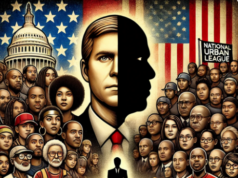Are Asian Americans Benefiting from Black Struggles? Texas Debate Intensifies
The intersection of racial dynamics in the United States is as complex as it is controversial. Recently, the debate took a sharp focus in Texas when a State Representative argued that Asian Americans are reaping the benefits of the long, arduous struggle of Black Americans for civil rights and equality. The comments stirred both applause and outrage, raising questions about intergroup dynamics, historical context, and shared challenges facing minority groups in America.
Breaking Down the Debate
At the heart of this assertion is the idea that the civil rights movement, led predominantly by Black Americans, paved the way for many of the rights and opportunities that immigrant communities now enjoy. The Texas State Representative questioned whether Asian Americans, who often achieve high socio-economic success in the U.S., owe a portion of their progress to the sacrifices made by Black activists over decades. To understand the validity and implications of this argument, it’s critical to take a closer look at American history and modern-day racial politics.
Black America’s Struggles and Triumphs
There is no denying that the fight for civil rights in America has been driven largely by the tenacity and sacrifices of Black individuals and communities. Among their achievements include some truly fundamental changes:
- The Civil Rights Act of 1964: This landmark legislation outlawed discrimination based on race, color, religion, sex, or national origin and laid the foundation for minority rights in the workplace and public spaces.
- The Voting Rights Act of 1965: This act addressed systemic voter suppression, particularly in the South, and ensured federal protections for minority voters.
- Brown v. Board of Education: This historic Supreme Court decision ended racial segregation in public schools.
These victories were not handed over, but achieved through marches, protests, and relentless advocacy by Black Americans, often met with brutal violence and oppression.
Where Do Asian Americans Stand Today?
Asian Americans, a diverse group encompassing people from vastly different cultures and countries, have often been labeled a “model minority” – a stereotype that suggests they are hardworking, law-abiding, and economically successful. While this term can be problematic, there’s some data to support higher educational attainment and median household income among certain Asian subgroups compared to the national average.
Many argue, however, that this narrative of success obscures the struggles Asian Americans face, from anti-Asian hate crimes to a range of socio-economic challenges among less visible subgroups, such as Southeast Asian refugees. So, does this success come at the expense of – or directly because of – the Black civil rights movement?
Do Asian Americans Benefit from Black Efforts? Views from Both Sides
The Argument Supporting the Representative’s Claim
Supporters of the Texas Representative’s claim argue that Asian Americans owe their current opportunities to a system shaped largely by the legacies of the Black civil rights movement. Here are some key points often cited to back this view:
- Before the Civil Rights Act of 1964, Asians faced restrictive immigration laws and outright discrimination. Black Americans’ hard-won legal victories dismantled many policies that oppressed all minorities.
- The progress made by Black Americans created a ripple effect, breaking down racial barriers that indirectly benefited other communities – including Asian immigrants arriving post-1965.
- Affirmative action policies, a product of the civil rights era, opened up educational and employment opportunities for all minority groups, not just Black Americans.
The argument frames Asian American success as partially rooted in systemic changes catalyzed by Black leadership and sacrifice.
Counterpoints from Asian Americans and Critics
On the other side of the debate, critics suggest that such claims oversimplify the complexities of racial relations and diminish the contributions of Asian Americans to their own success. Here are some counterarguments:
- Asian Americans have created their own pathways to success: Many Asian immigrants brought a cultural emphasis on education, hard work, and family that played a significant role in their upward mobility.
- Discrimination against Asian Americans persists: The model minority stereotype minimizes the systemic racism they continue to face, from hate crimes to glass-ceiling career barriers.
- The struggles of Asian Americans are not monolithic: Not all Asian subgroups experience high success rates. For example, Southeast Asians, particularly Hmong and Cambodian Americans, face high poverty and low educational attainment rates.
Many Asian Americans feel the narrative that they “benefited” from Black struggles pits minority communities against each other, drawing attention away from shared struggles against systemic oppression.
Is the Conversation Helpful or Divisive?
The remarks of the Texas State Representative have sparked reflection but also frustration among advocates for racial equity. Conversations about intergroup relations can sometimes lead to a zero-sum approach that implies one group’s progress comes at the expense of another. However, the reality is much more nuanced.
Instead of focusing on whether one minority group is “benefiting” off the work of another, advocates suggest the conversation shift toward addressing shared issues such as:
- Racial inequality in policing and the justice system.
- Education reform to close achievement gaps across all demographics.
- Discrimination and the dismantling of racist stereotypes affecting all communities of color.
A Call for Unity
The divisiveness of pitting minority groups against one another often benefits only one party: those invested in maintaining the systemic status quo. There is power in solidarity among diverse racial and ethnic groups – a collaborative effort that can push back against systemic injustice while also acknowledging each group’s unique histories and contributions.
Conclusion: Context is Key
The question of whether Asian Americans are benefiting from Black struggles is one that demands context. Yes, Asian Americans – as well as all minority groups – have benefitted from the sweeping changes driven by the Black civil rights movement. However, interpreting this as a free pass undermines the agency and contributions of Asian Americans themselves.
At the same time, this discussion is a reminder that the fight for equality and equity remains unfinished. Both Black and Asian American communities – and many others – continue to face shared and unique challenges within a society grappling with its identity. The true path forward may not lie in debating which group “benefits” but in building alliances that address the broader systems of oppression affecting all.
Let the Texas debate be the start of a deeper, more productive dialogue – one that bridges communities rather than divides them.
“`








